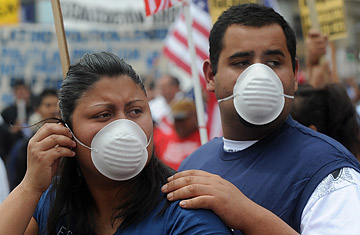
A woman and man in downtown Los Angeles wear masks to protect against swine flu and other communicable diseases
Scared about catching the H1N1 flu? Looking for protection? Have I got just the thing for you: a shampoo that can safeguard users from H1N1 infection. Or how about a dietary supplement — specially designed for children and infants — that can stop transmission of the virus? Or for on-the-go use, perhaps a hand spray that leaves a layer of ionized, virus-killing silver on your hands?
There's just one catch: all of the above treatments are as fake as a two-dollar coin. They're just a few examples of the more than 100 products being sold online that the Food and Drug Administration (FDA) recently identified as fraudulently claiming to offer some kind of defense against the new H1N1 virus. Since May 1, the FDA has sent dozens of letters to peddlers of sham H1N1 products — part of the agency's stepped-up anti-fake campaign that has agents sweeping the Internet for hoaxes and shutting down scammers. "This is a great example of using enforcement as a tool to protect the public health and achieve a credible deterrent," says Alyson Saben, the deputy director of the FDA's office of enforcement, within the office of regulatory affairs.
Products with phony H1N1 claims began popping up on the Internet less than 48 hours after Kathleen Sebelius, the Secretary of Health and Human Services, declared H1N1 a public-health emergency on April 26. That's not unusual. The FDA says every time a new health threat pops up, fly-by-night companies take advantage of public fears by offering products that are too good to be true. "We've had similar situations with SARS and with avian flu," says Gary Coody, the national health-fraud coordinator for the FDA.
The difference this time is that the FDA is taking the offensive, ferreting out deceitful product claims and publicizing them. FDA staff members began performing daily Internet searches, looking for products that claimed to offer special protection against the new virus. Since all the suspicious products were classified as supplements or, in the case of some, as food, any claims by their makers that these products protect consumers against swine flu — in other words, to have a druglike effect — were automatically illegal.
After identifying the products, the FDA sent out warning letters to manufacturers, ordering them to stop making unlawful claims related to H1N1 or else withdraw the products immediately. Those companies that failed to comply could be hit with criminal prosecution. "We wanted to make the public aware of what it might be purchasing, and take care of themselves," says Saben.
So far, the FDA's aggressive tack has been working. Most of the targeted companies removed their fraudulent claims as quickly as they put them up. Through June 22, the FDA issued 54 warning letters involving more than 100 products, achieving compliance with nearly three-quarters of them. "The bottom line is that we want to make sure that these products don't proliferate in the marketplace and harm consumers," says Saben.
The unapproved products can be found on the Fraudulent 2009 H1N1 Influenza Products List website, but here's a sampling of the most dubious wares:
• Ageless Herbs' Curing Pills, which profess to clear up a case of H1N1
• Swine Flu Protection Gloves from Emergency Disaster Systems, which would protect wearers from infection
• Super Immune Booster from Wellness Resources, which claims to make you immune to the disease
• Swine Flu Advisor — my personal favorite — an electronic device that claims to use "photobiotic energy" and "deeply penetrating mega-frequency life-force energy waves" to strengthen the immune system and prevent H1N1 infection
Anyone who really believes in claims as ludicrous as these, some might say, deserve to be fooled. But the FDA points out that in the case of a public-health emergency like H1N1, we all have an interest in making sure that quack products are exposed, lest they allow the virus to spread more easily. "That's why the FDA has put out an aggressive strategy," says Saben. "These products pose a significant threat to public health." The products might be fake — but the H1N1 virus is very real.
